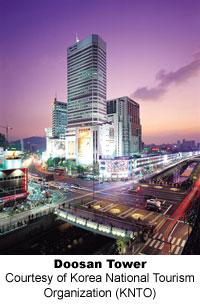
Doing Business in Korea
South Korea is a very modern, advanced country with an excellent transportation infrastructure, modern architecture, highly advanced telecommunications and excellent hotels. Although the country appears to be very westernized, it remains very traditional South Koreans have a great respect for family, age and hierarchy, and such elements come into play when selling into the market. The American businessperson, as a foreigner, is generally exempt from these social constraints. However, one should be prepared to answer rather probing questions as to age, marital status and education, which are asked in order to establish a social hierarchy. Business and pleasure are mixed together since business relationships are based on personal ones. Although alcohol does play a major role in establishing and cementing relationships, not to mention the “no-rae-bang” sing along (karaoke clubs) while drinking, foreigners are not expected to compete with their new friends.
Confucianism is still the strongest ethic in South Korea and reinforces thinking on behalf of the group. Individualism is regarded as selfish. So, when negotiating in South Korea it is worth bearing in mind that proposals will probably fare better if they are presented in the context of benefiting the group. Relationships are all-important. Consequently, “cold calling” is not recommended in this market. Introductions are an absolute prerequisite to setting up a meeting. Therefore, it is important that American companies be introduced into the market by a third party—be it a private consulting firm or a government agency like the U.S. Commercial Service in South Korea. The staff of the Commercial Service in South Korea has a wealth of contacts that have been established over decades and the staff is ready and willing to assist American companies in opening doors to future business.
Korean Business Cards. Properly formatted business cards are a must in South Korea. Including individual name, position title, and company name are imperative. The position title will dictate at what level a South Korean company will receive you. The giving and receiving of business cards is important and it is customary to show respect for the business card you are to receive by accepting it with both hands. Cards are also presented with both hands. Bilingual business cards are preferable.
Negotiating style is more important in South Korea than in the United States. An abrupt or demanding style may cause a company to lose the business regardless of the better price or excellent technology that may be offered. South Korean negotiators are second to none, so use every advantage to seal the deal. A market entry strategy should include working with an organization within South Korea, such as the Commercial Service to identify appropriate business partners and to obtain market and business information. Other excellent sources of information include the American Chamber of Commerce in South Korea, as well as South Korean Government organizations such as the Ministry of Commerce, Industry and Energy (MOCIE), the Korea Trade-Investment Promotion Agency (KOTRA) as well as the non-government Korea Importers Association (KOIMA).
Contracts in South Korea are not as ironclad as in the United States, and usually regarded as a loosely structured consensus statement that broadly defines what has been agreed but also permits flexibility and adjustment in interpretation. The concept of a contract, in the Western sense, is an issue the South Korean Government has been addressing by providing model contracts for South Korean companies, especially in the areas of technology licensing. At a minimum, both parties must be in agreement that the obligations in the contract are fully understood and intended. Above all, as in any market, seek legal counsel prior to signing any contract.
Korean names have three parts with the surname usually being given first. Since there are so many people with the same last name, it is useful to know the person’s entire name as well as formal title so as to keep confusion to a minimum.
South Korea is not a market where success will be achieved over the short-term. One needs to plan to be there for the long haul. At the same time, the South Korean market can be very lucrative and well worth the effort.
For more information, please visit our Frequently Asked Questions page for ordering translated business cards.
You can also use our express FREE Asian Business Card Translation Quote Request Form to select your options and receive a detailed quote for your exact order.
_________________________________________________
AsianBusinessCards.com
Japanese, Chinese & Korean Business Card Translation, Typesetting & Printing Experts



